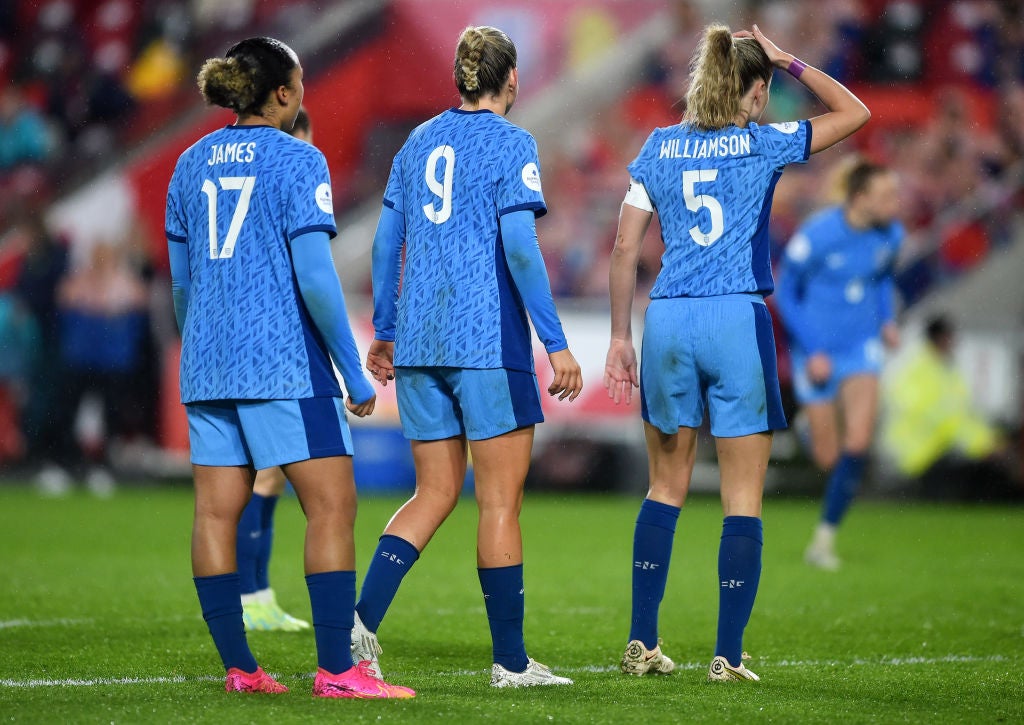
One hundred days before the Women’s World Cup gets underway, one of the favourites suffered a setback. Not just one of the favourites in fact, but the newly crowned world champions - of a tongue-in-cheek fashion at least.
England beat Brazil on penalties in the Finalissima last week, asserting themselves as the top international side between Europe and South America - though unlike in the men’s game, where every single World Cup winner has come from one of those two continents, it’s 16 years since the elite end of the women’s game saw a nation triumph from either one. Instead, Asia and North America - Japan and USA, to be specific - have shared the last three iterations.
Even in victory, a few cracks appeared in that Wembley encounter for the previously unbeatable Lionesses and, on Tuesday night, the wall came down entirely. Or perhaps to be more accurate and less hyperbolic, a piece of it did, as a 2-0 friendly defeat to Australia doesn’t have to necessarily yield any longer-term damage than that, even if it was the first loss in 31 under Sarina Wiegman.
Truth be told, a couple of below-par showings and a maiden defeat for a team which has already won two significant trophies - plus a couple of Arnold Clark Cups - might prove to be the most effective shot in the arm of all before the biggest test rolls around.
Certainly, Wiegman and her players were taking the positives from the negatives after a less-than-stellar second-half showing against Brazil. The head coach spoke of using “every experience [to] help you to move forward” after needing penalties to lift the trophy, while captain Leah Williamson acknowledged the level of play left plenty to be desired amid greater prizes to come. “Second half we weren’t best pleased with our performance but to win a penalty shootout at Wembley, it’s not too bad is it?” she said at the time. “Everybody has got their eyes on it [the World Cup]. Today was a little stop in terms of what the focus is on but every time you win it makes you want to win more.”
And that is ultimately the point. Unbeaten runs are impressive, and perhaps show the scope of what a team could achieve, but they are not an end goal in themselves - trophies are. If winning makes great sides want to do so again and again, then losing has a redoubling effect: making them not want to experience that side of a result, while also reinforcing that the factors which made them successful in the first place must be present game in, game out.
This is, after all, a very close-knit group which has experienced those emotional occasions together.
A drop-off from every great side can be expected. Winning relentlessly is tiring, physically and mentally, despite the enormous highs it can bring.
But it’s the reactions to the defeats and disappointments which can elevate great teams into historic ones.

England don’t have far to look for inspiration in this regard, either.
In the Women’s Super League, Chelsea have won the last three titles in a row, but as recently as last season had to show that ability to bounce back after setbacks. From December into January, Emma Hayes’ side won just once in a run of five important games, losing four points from six in the title race and exiting the Women’s Champions League group stage in a threeway tie for points. They fought back and ended the campaign on a 12-match win streak to claim a WSL and FA Cup double.
On the international stage, the recent men’s World Cup holds a similar example of how defeat can lead to a refocus and renewed determination. Argentina came into the tournament in November unbeaten in well over three years, a 36-game streak which surpassed even that of the Lionesses. And then they lost, to Saudi Arabia, in the opening game.
It did not lead to a meltdown. It did not lead to abandoning principles, players or self-belief from the team; instead minor tweaks and adaptations were made, a player or two seized their chance when called upon and the biggest trophy of all was claimed a month later.
There’s not quite the same urgency or earth-shattering headlines this time around for England after losing 100 days out. But in the next 99, before the tournament starts in Auckland and Sydney, Wiegman and her coaches will be ensuring everything is geared towards underlining the importance of recapturing those best levels when the real action starts. The players themselves are capable, have proven that already, and a small reminder of what’s required - relentlessly and without exception - to beat the world’s best is no bad thing before then.







